Apr 27, 2025 – Farming, Harvesting Vegetables from the Garden
Good morning. Dawn has broken at Dubuk Jungto Retreat Center. Today, Sunim worked on farming under the spring sunshine.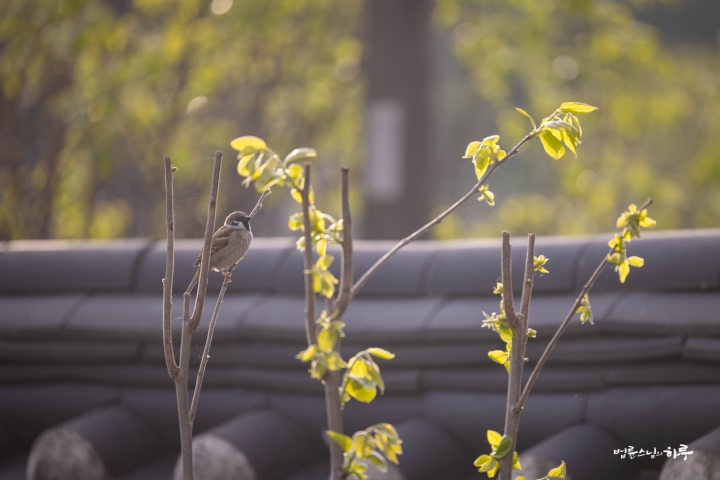
After completing his morning practice and meditation, and reviewing manuscript corrections, Sunim headed to the vegetable garden.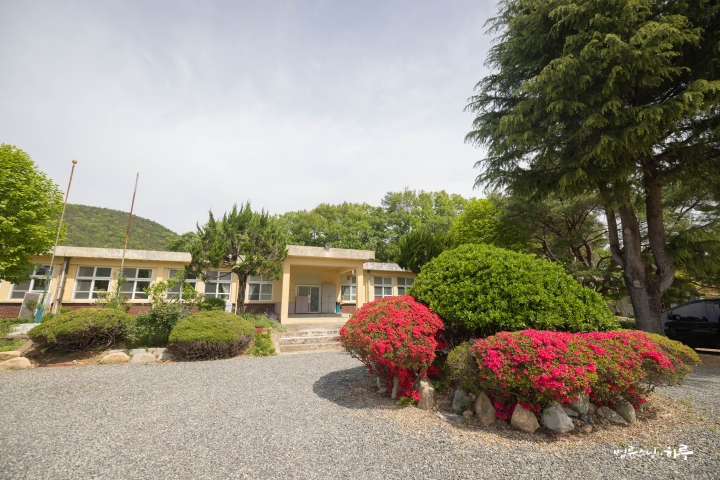
In the garden, lettuce and cilantro that Sunim had planted a month ago were growing abundantly. He felt grateful for how well the vegetables had grown despite not being able to tend to them diligently due to his daily 100-Day Dharma Talks.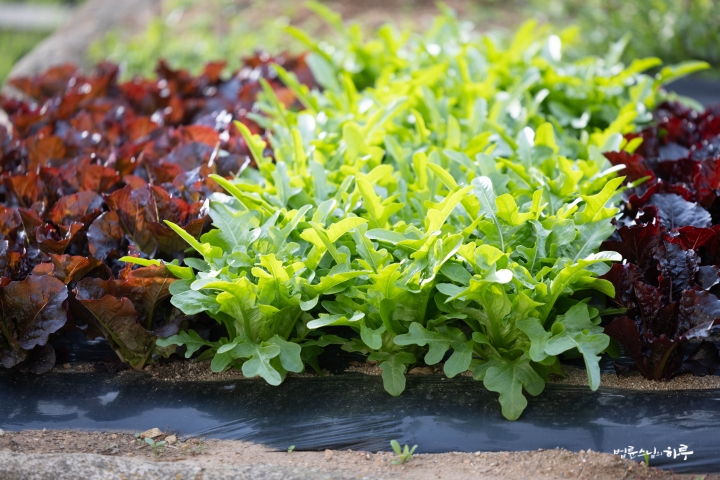
Sunim harvested lettuce and cilantro for the Seoul lay Sangha and visitors to The Peace Foundation. He carefully picked each lettuce leaf with attention. Pine pollen had settled on each leaf.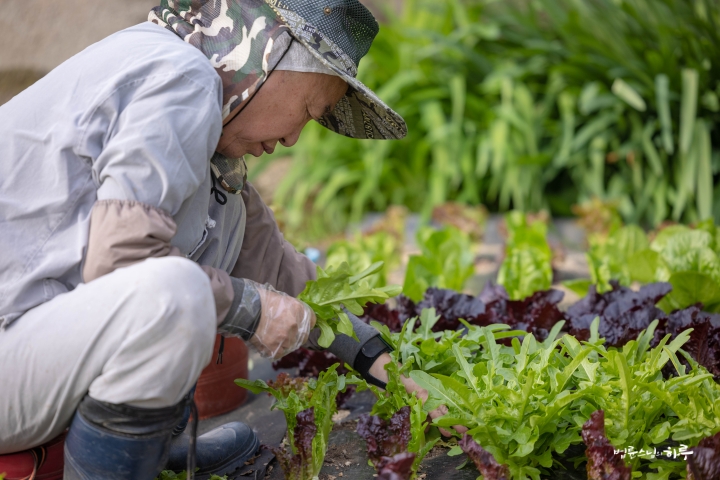
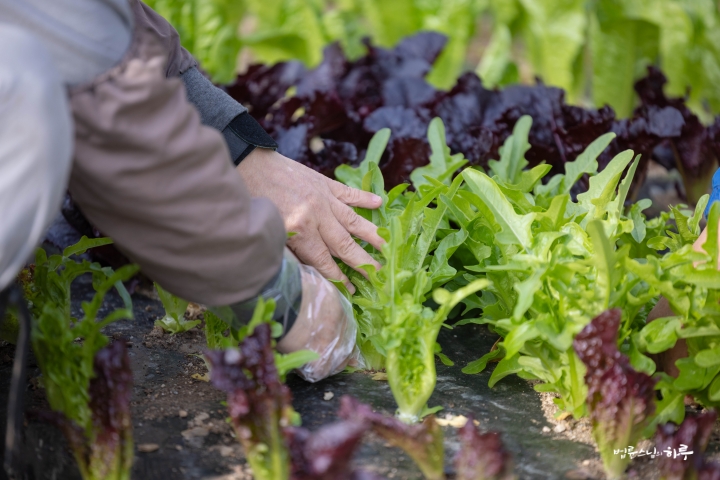
“I should have watered them yesterday before picking the lettuce, but I didn’t think of it.”
The lettuce leaves, bathed in sunshine, glistened with a light green hue and were full of vitality. Just looking at them conveyed their fresh aroma.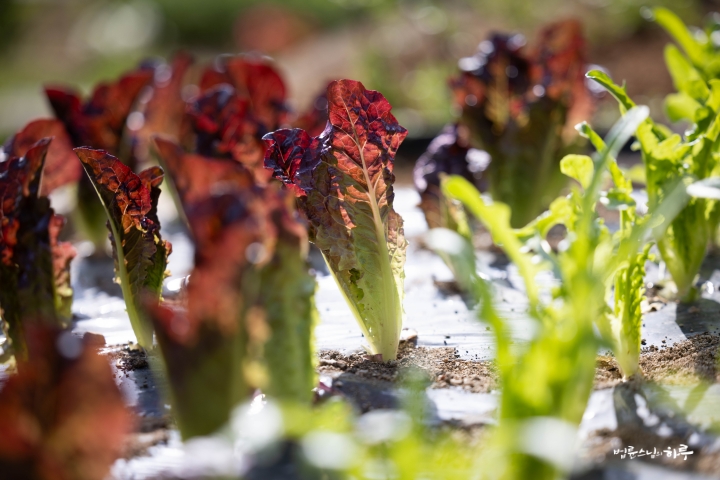
As Sunim continued picking lettuce, the sunlight grew stronger.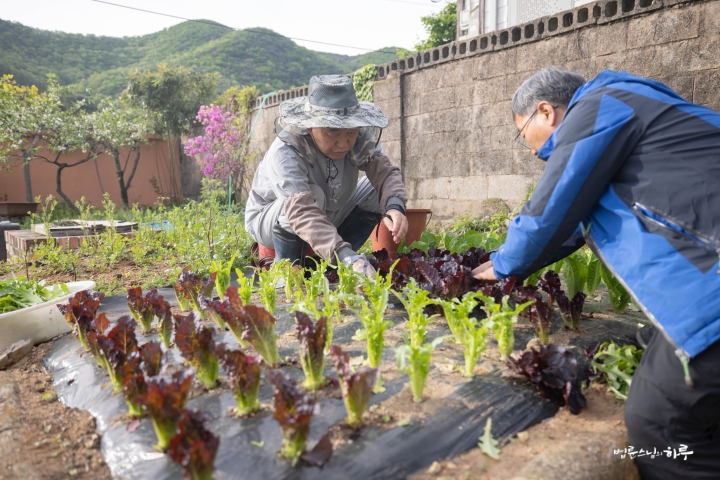
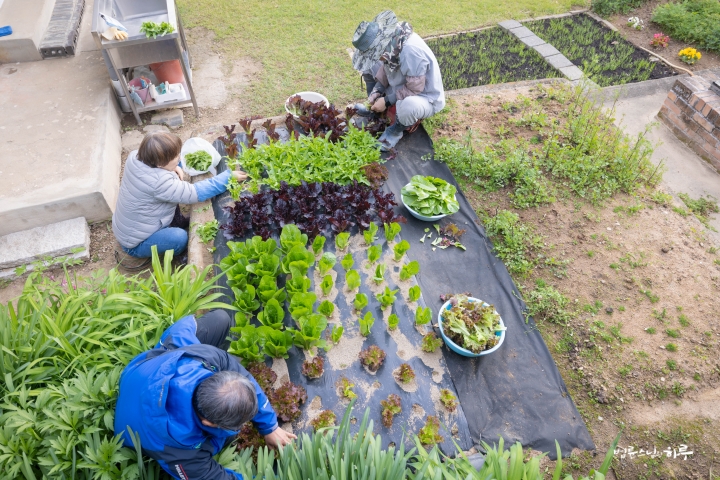
“It feels like summer is already approaching.”
Sunim divided the lettuce into several basins to package them by variety. After picking all the usable leaves, only the bare stalks remained.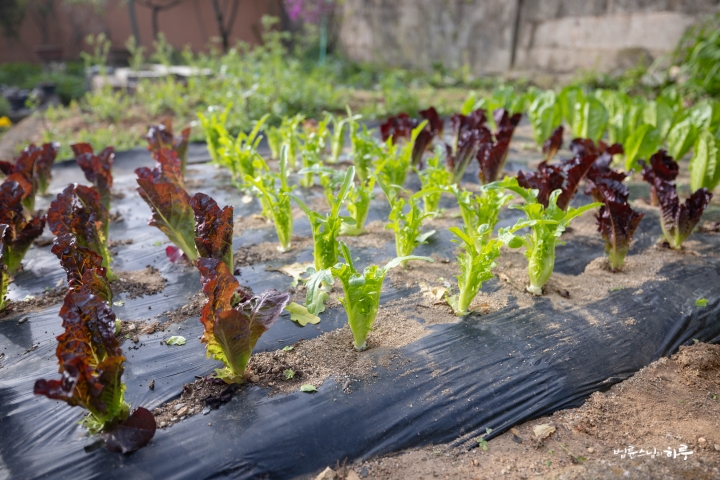
The cilantro planted last winter had grown vigorously and was already about to flower. Sunim used scissors to snip the cilantro and placed it in a basin.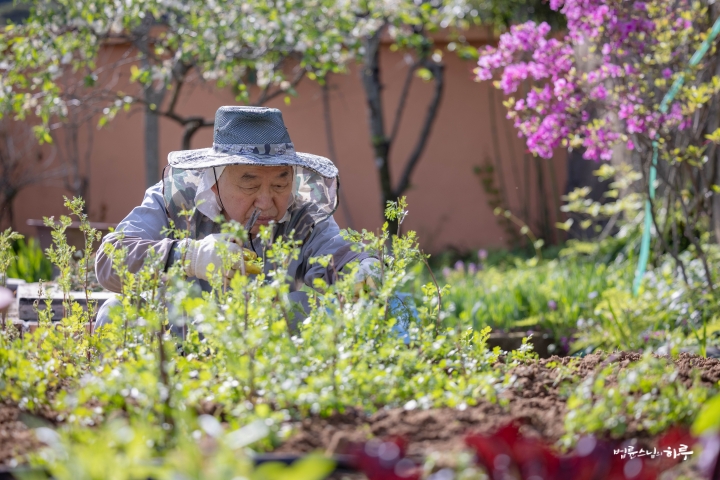
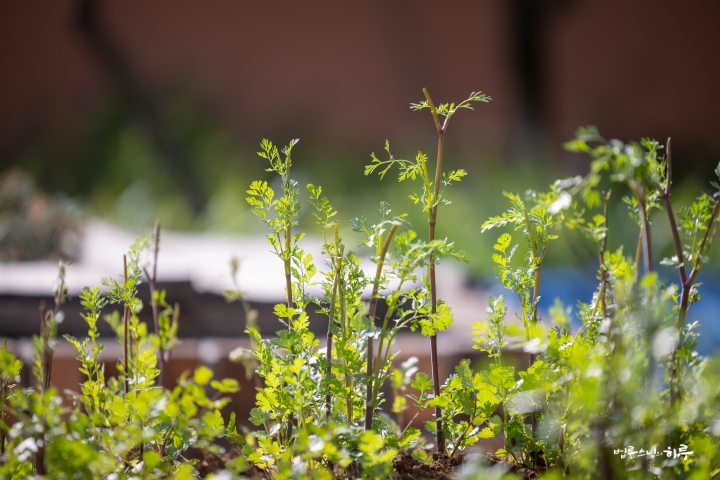
After harvesting all the lettuce and cilantro, Sunim stood up and stretched his back.
“Oh, my back!” 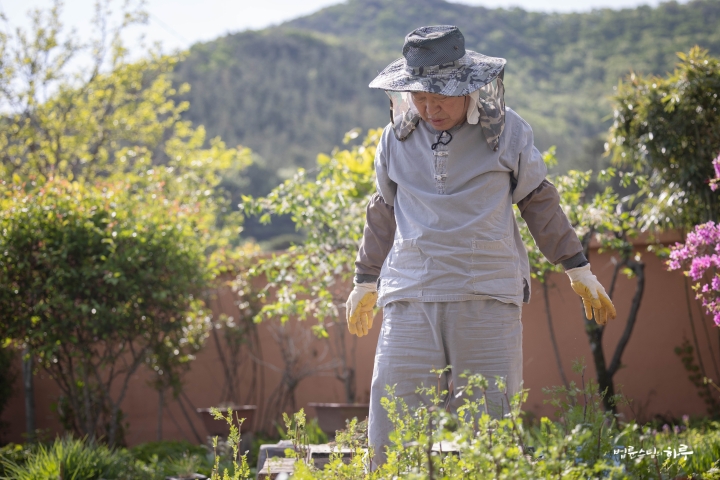
As he bent down again, he noticed weeds growing in many places. Sunim brought a hoe to pull out the weeds and lightly turned over the soil. Sitting down to weed, he saw weeds sprouting everywhere. Quite some time passed as he pulled them out.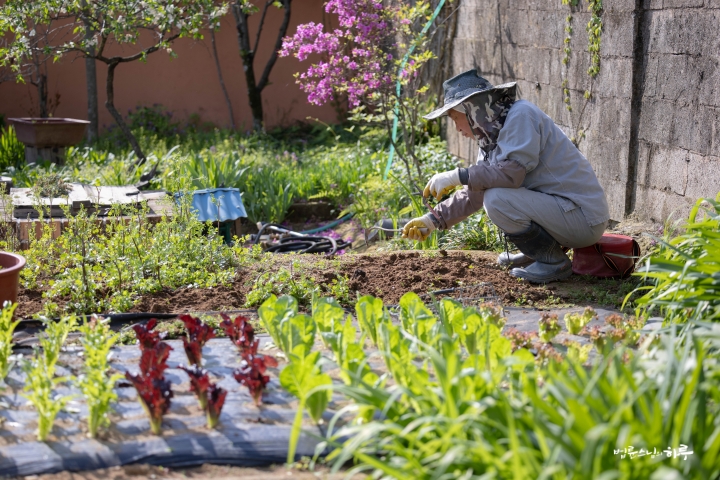
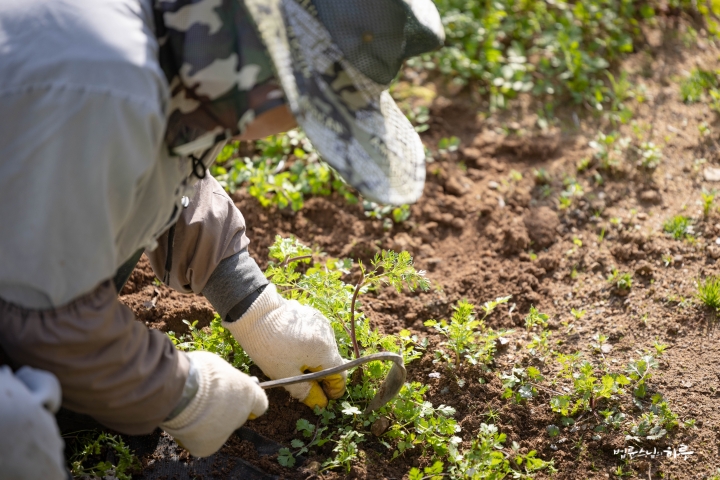
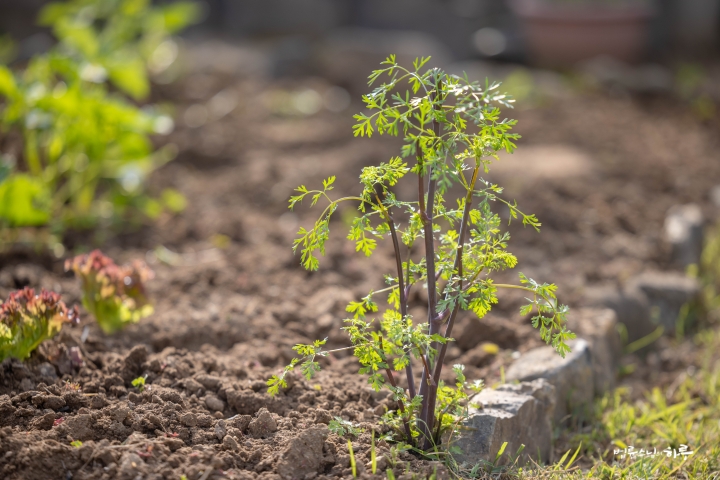
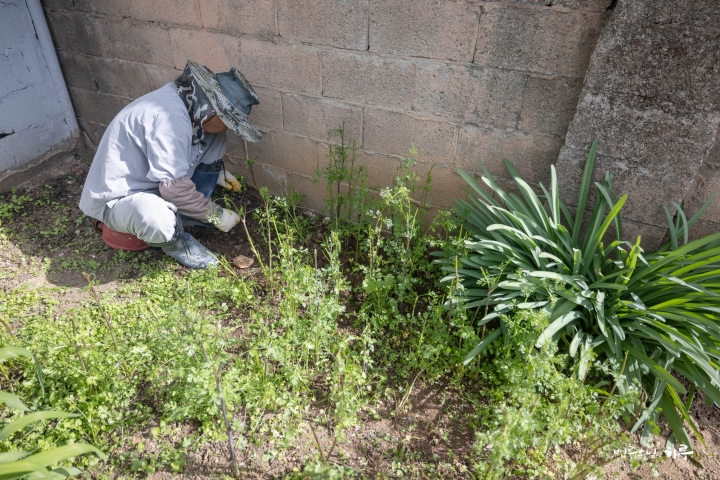
Sunim moved to the garden bed where lettuce seedlings had been planted. Here, the seedlings had suffered from cold damage and were barely growing. He picked only the outer leaves, pulled weeds, and turned over the soil.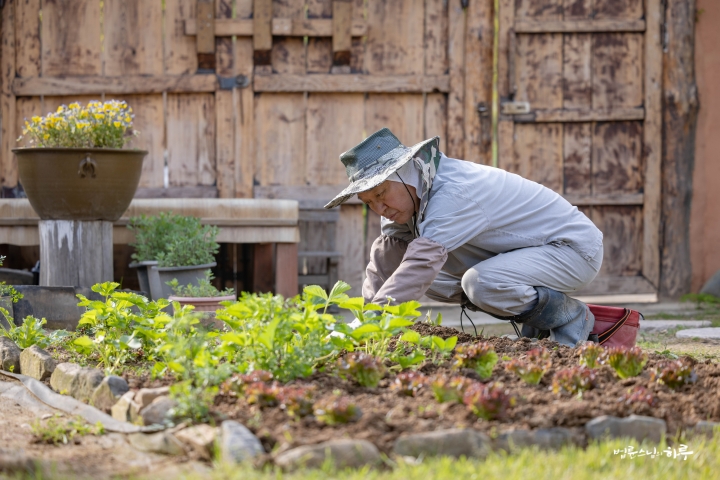
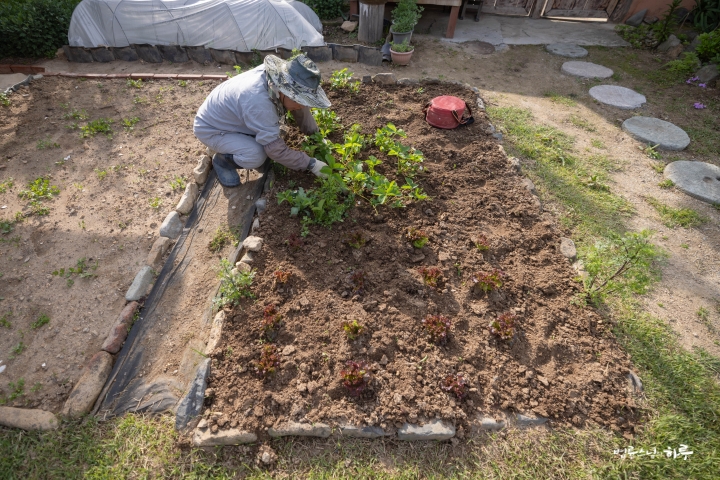
He went to the area where seeds had been planted this spring and covered with plastic. Lifting the plastic wide open, he examined how much the lettuce had grown.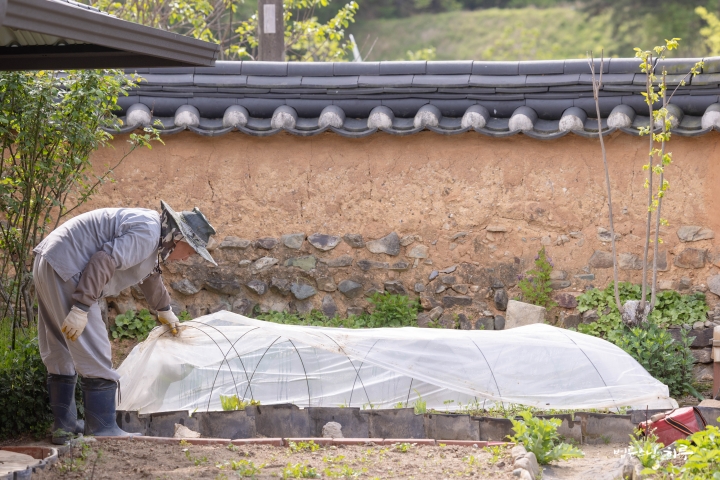
“The lettuce isn’t growing, but the weeds are thriving. I must have planted seeds that were too old.”
Lettuce seeds apparently don’t germinate well after two years. Dharma Teacher Myodeok smiled and said:
“So it wasn’t your lack of skill, but the seeds that were the problem.”
Sunim began turning over the soil with his hoe.
“Let’s plant something else here.” 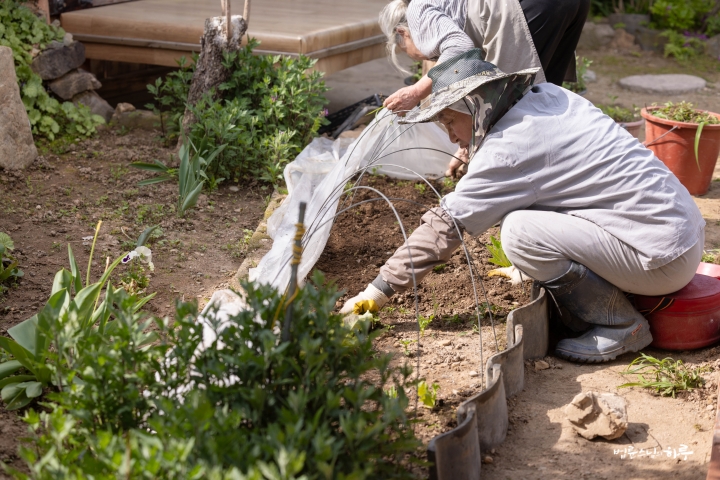
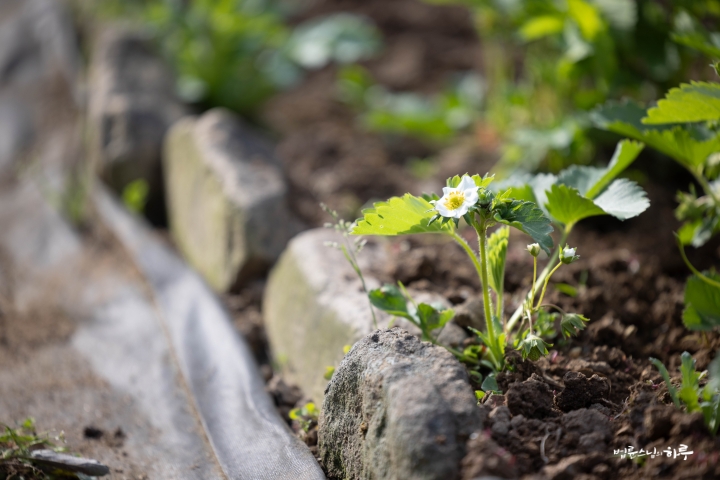
The chrysanthemums had also started to grow quite tall. Sunim brought pruning shears.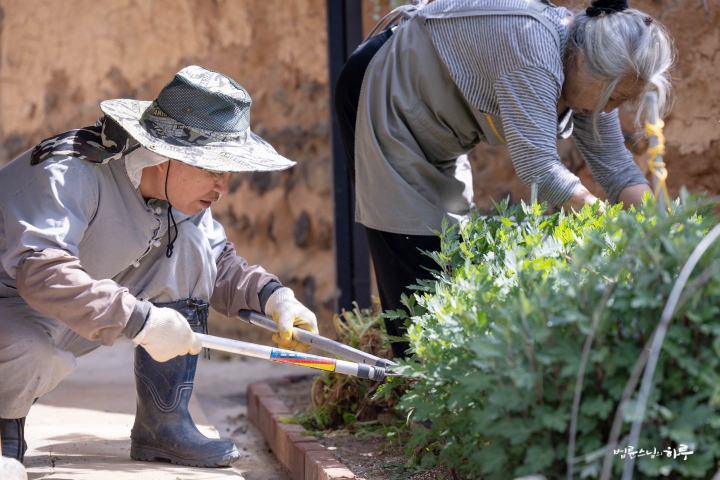
“Chrysanthemums need branches to spread from the base so they don’t fall over later. Let’s prune them a bit now.”
Sunim snipped the upper parts with pruning shears to allow the branches to spread well from the base of the chrysanthemums.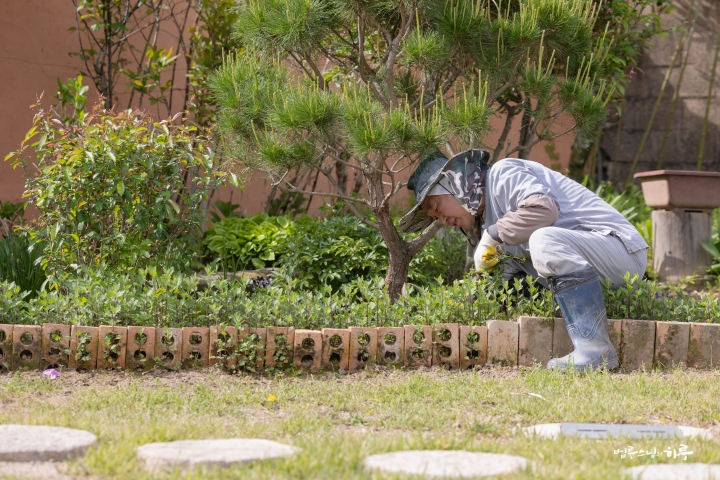
Since vegetables wilt quickly after harvesting in bright sunlight, they were immediately packaged and placed in boxes. When sorted by type, they filled several boxes. Dharma Teacher Myodeok said with a pleased expression: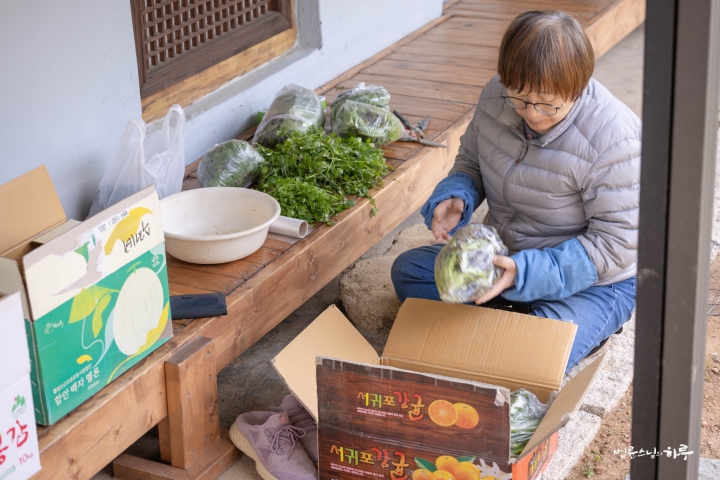
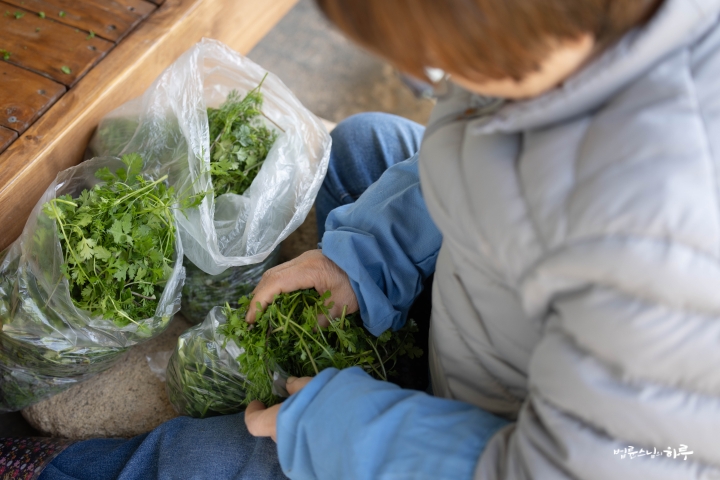
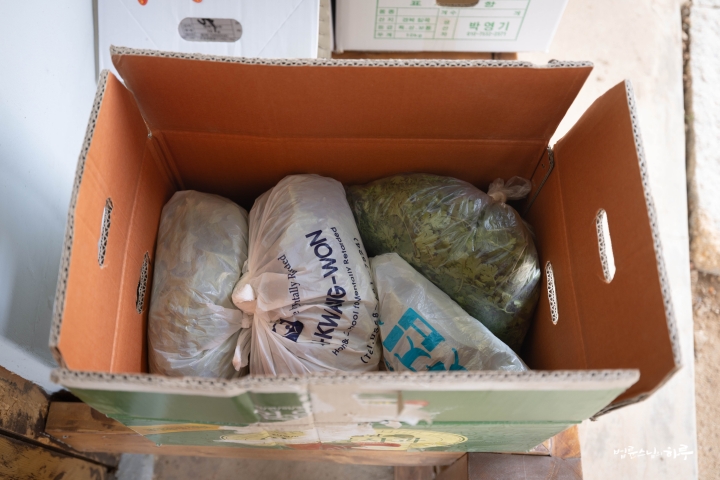
“That’s quite a lot. When we take these to Seoul, everyone in the Sangha will get to taste some.”
After finishing the farm work, Sunim smiled and said:
“I should be doing more leg exercises, but today I got plenty of upper body exercise instead.”
After harvesting vegetables from the garden and weeding, the entire morning had passed.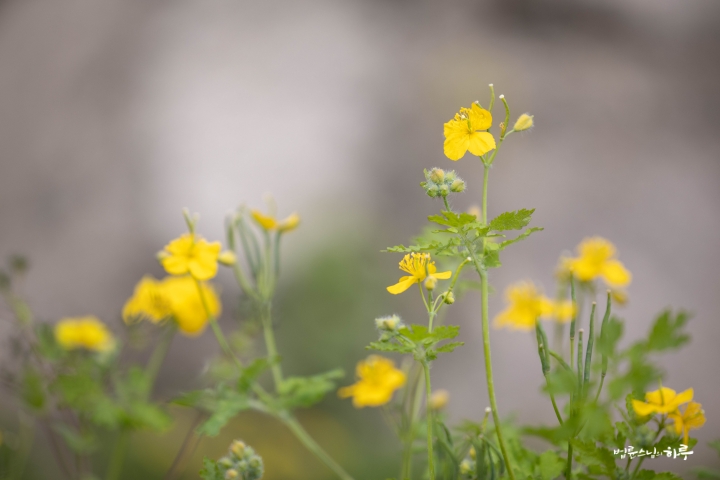
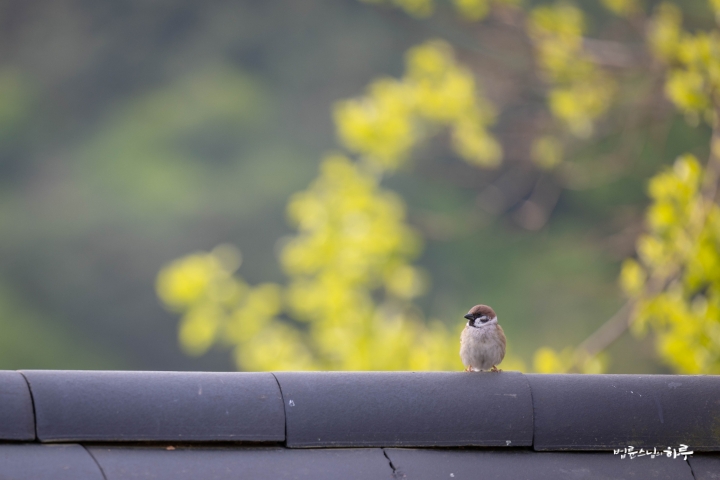
After lunch, the boxes of harvested vegetables were loaded into the car, and at 1:30 PM, they departed from Dubuk Jungto Retreat Center for Seoul.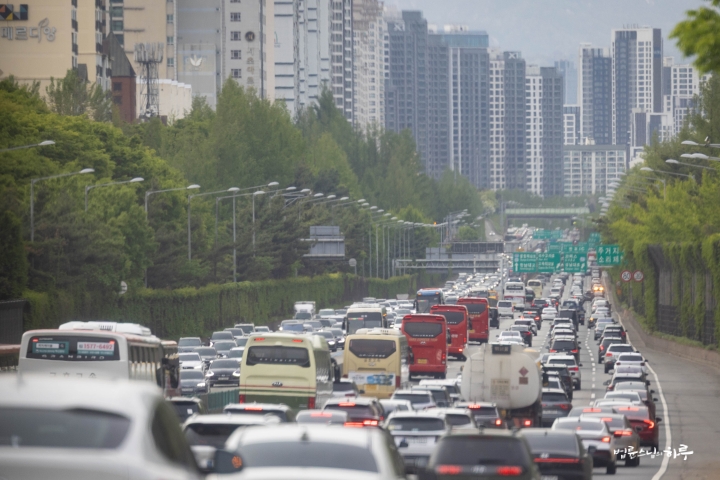
After a four-and-a-half-hour drive, they arrived at the Jungto Social and Cultural Center in Seoul at 6 PM.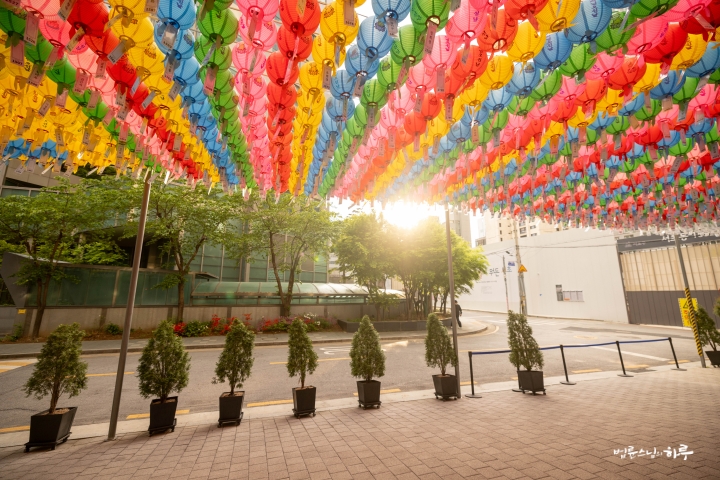
As the sun set, Sunim spent the evening indoors attending to business matters and manuscript corrections before concluding his day.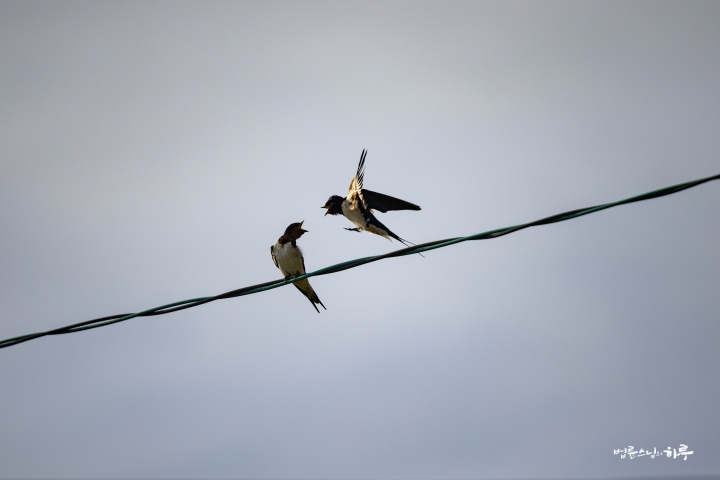
Since there was no Dharma talk today, I’ll conclude with a conversation between a questioner and Sunim from the Friday Dharma Q&A the day before yesterday.
Making Decisions Is Always Difficult for Me
“You’re already living well. If you want to make a decision, just make it, and if you can’t decide, then don’t decide and just leave it. You’re making problems out of things that aren’t actually problems.
When you hesitate between doing one thing or another, it means the weight of both options is similar. When someone debates whether to divorce or not, it means the benefits of divorcing and staying married are comparable. For example, if you have a 90% desire to stay married and only a 10% desire to divorce, you won’t hesitate. You might briefly think about divorce when you’re upset, but then you move on. But if your husband can’t earn money, is violent, makes scenes when drunk, has affairs, and is unattractive, would you hesitate? You would just make the decision yourself. The fact that you’ve come to ask me means the two options are similar.
When you ask me questions, you expect me to conclude which option is better, but that’s not the case. From listening to you, I can tell that ‘the two options are similar.’ So either choice is fine. When I say either choice is fine, it also means problems will arise regardless of what you choose. If you divorce, you’ll regret it afterward, and if you don’t divorce, you’ll regret not divorcing. It’s fifty-fifty either way. Conversely, if we flip this around, what do we get? The conclusion is: ‘It’s okay to do it, and it’s okay not to do it.’ 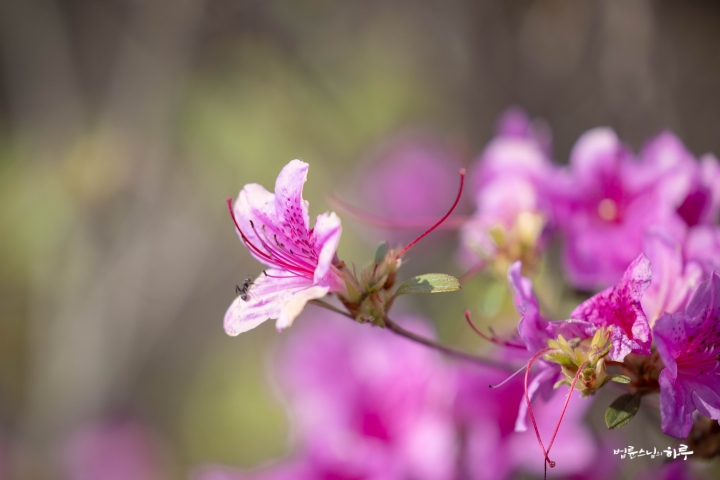
There are two options. You’ve been living this way until now, so there’s no reason you can’t continue. You can decide to keep living together, or you can conclude that it’s time to live alone. The issue isn’t as significant as you think it is.
The two options are similar, and if you must reach a conclusion, you could flip a coin to decide. If you don’t need to make a decision right away, you can just leave things as they are. If you don’t force a conclusion, the situation will naturally resolve itself. The other man might find another woman and leave, or he might change his mind and pursue you again. When you’re unsure about which of two men to marry, don’t rush to decide—just let things be. If you simply pray and wait, one of them might find another woman and leave. Then only one remains, and the problem solves itself. Even if both leave, that’s also a resolution. Whether you make a decision or let things be, eventually a decision will be made.
Feeling anxious about this is all about desire. It’s wanting good results without putting in the effort. There’s no need to overthink trying to gain that 1% advantage when the options are 49% versus 51%. If you’re hesitating, just recognize that the options are similar. If you must decide, choose either one; if it’s not urgent, just leave it be. At the very least, there’s no need to worry about it.
In marriage, some people prioritize finances, while others value trust or emotional connection more. Everyone is different. Advice from others varies too. Some might say, “Why stay with a man who doesn’t contribute financially?” while others say, “Money isn’t everything in life.” These comments are essentially meaningless—just casual remarks from strangers or fortune tellers. If you hadn’t asked for opinions, you wouldn’t be worrying about this. If you did ask, you could simply follow whatever advice was given.
In reality, there’s no problem at all. Saying “I can’t make a decision” without actually trying to decide is like saying “I want to go but can’t” when you’re not actually going. If you want to make a decision, just make one decisively. If you don’t want to decide, then simply leave things as they are. 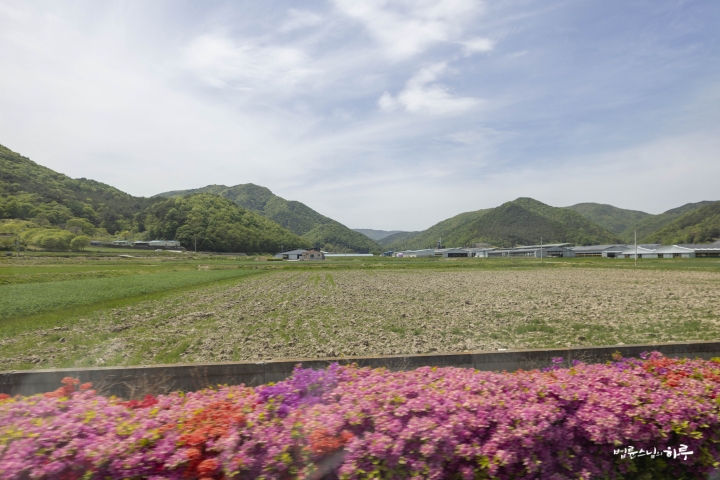
Take a moment to examine yourself. This conflict arises from the contradiction between your intention and your inner psychology. Instead of thinking, ‘I must reach a conclusion,’ you should observe what your mind is actually feeling. Ask yourself whether you truly want to make a decision now, or if you’d prefer to leave it for now. If you want to reach a conclusion but are hesitating because you don’t know which option is better, then the ratio is about even—just pick either one based on my advice. But if you don’t want to make a decision right now, then just leave it. Ultimately, this kind of indecision comes from psychological anxiety. If it gets worse, you can seek treatment at a hospital. These days, psychological anxiety is becoming increasingly common among young people. The problem is that they don’t recognize anxiety as the cause, but instead keep looking outward, thinking, ‘This is the problem,’ or ‘That is the problem.'”
“I understand. Thank you.”
Tomorrow is the 71st day of the 100-Day Dharma Talk. In the morning, Sunim will give the second lecture on the Heart Sutra at the Dharma Hall on the third floor of the Jungto Social and Cultural Center. In the afternoon, he will have consecutive meetings with visitors at The Peace Foundation, and in the evening, he will deliver the 15th lecture of the Buddhist Social Studies Course in the main auditorium in the basement.






I’m a big fan of the day in the life of sunim. Thanks for all efforts to deliver letters.